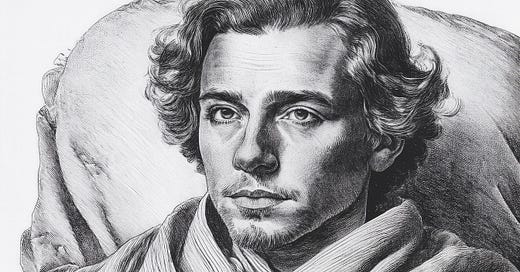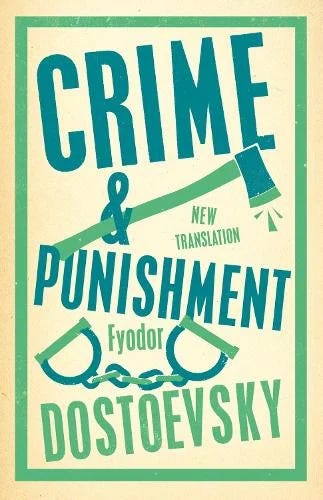Welcome to Week 11 of my slow-read of Crime and Punishment. This week’s chapter is Part Two, Chapter 4.
Please bookmark the homepage for the read-along. Here, you’ll find links to everything you need as we read the novel together.
Request a Translation Comparison
Paid subscribers may request translation comparisons for anything that jumps out in whatever translation you’re reading.
Once requested, it will be added to the public translation comparison spreadsheet.
If you enjoy this content and would like to help me to keep it going, please consider a paid subscription.
Thank you. 🙏🏻
This week’s characters
Characters in this week’s chapter in the order that they are mentioned. Raskolnikov isn’t mentioned because he’s pretty much in every chapter:
Zosimov • Razumikhin • Nastasya
Part Two, Chapter 4 Synopsis
All quotations in this post are taken from Roger Cockrell’s translation of 2022, Alma Classics, © Roger Cockrell 2022
Zosimov calls round and gives Raskolnikov a clean bill of health, but says he should take it easy. Bizarrely, he’s not to ‘eat mushrooms or cucumbers, of course, and you should avoid beef… but I don’t need to tell you that, do I?’ I have no idea what that’s about. Any ideas?
Razumikhin asks if Raskolnikov will be well enough to come to his housewarming party and invites the doctor. He goes through the guest list and, when he gets to Zamyotov, the doctor wonders what on earth he and Raskolnikov would have in common with a man like Zamyotov. It’s a funny little scene in which Razumikhin then goes on to talk about principles and how, ‘if you were to look at people from every aspect, there wouldn’t be many nice ones left, would there?’ But, it turns out that Razumikhin and Zamyotov do have something in common: a house painter. They end up discussing the house painter who was decorating the room below Alyona Ivanovna’s on the day of her murder (the room in which Raskolnikov hid). Seemingly, he has been questioned by the police.
It’s the first time that Porfiry Petrovich is mentioned, though only by first name and we aren’t told of his familial relationship with Razumikhin. We learn that the police have questioned Koch and Pestryakov, the two men who came to Alyona Ivanovna’s door while Raskolnikov was hiding behind it. We then get a whole story about earrings and a pawnbroker and the decorators… basically just filling in the situation with police interviews and local gossip since the murder took place while Raskolnikov was ill. It turns out that one of the decorators had gone back to clear up and found the earrings behind the door. Upon hearing this, Raskolnikov sits up and speaks for the first time during this whole story: ‘“Behind the door? Lying behind the door? Behind the door?” Raskolnikov shouted suddenly, looking at Razumikhin with an expression that was both confused and terrified.’ This was the door behind which Raskolnikov hid.
Razumikhin continues his story and explains why he thinks the decorator isn’t guilty of the murder. He then gives his own idea of how the earrings came to be behind the door and basically describes Raskolnikov’s movements as they actually happened. We don’t get Raskolnikov’s reaction to this because, just as Razumikhin is finishing his explanation, someone else enters the room…
Translation Points
During his story, Razumikhin asks a question about the nature and character of the legal system to do with the psychology of a person’s state of mind. It seems to be a philosophical point that Dostoyevsky is exploring and it’s worth taking a look at how the translators have dealt with it. Cockrell renders it as follows:
Yet taking into account the nature and character of our legal system, do you suppose that they can accept, or be in any position to accept, a fact based solely on a psychological impossibility or on someone's state of mind, a fact that is irrefutable and which trumps any circumstantial evidence of any kind in their possession? No, they won't ever accept such a fact, because, as they say, they have found the box and they know that someone tried to hang himself – which in their opinion 'he would never have done, had he not felt he was guilty'. There's a basic question for you! It explains why I've become so 'overexcited'! Please understand!"
The translations vary a lot here. In the first clause alone, we have the following translations ofюриспруденция / iurisprudentsiia:
Legal system - three (Garnett, Katz, Cockrell)
Judicial system - one (Pasternak-Slater)
The law - one (Ready)
Jurisprudence - two (McDuff, P&V)
Judicial authorities - one (Coulson)
The other seven translations are in the comparison spreadsheet.
Thank you for reading
Thank you for reading with me.
This book group is entirely funded by its readers. If you enjoy my posts, please consider a paid subscription to support me and this work.
Or if you’d rather just buy me a coffee, I’d be very grateful!






Юриспруденция, I think, is derived from the Latin "iurisprudentia," just like the English word "jurisprudence."
It's interesting that the translators decided to go different ways. Thanks for the comparison.